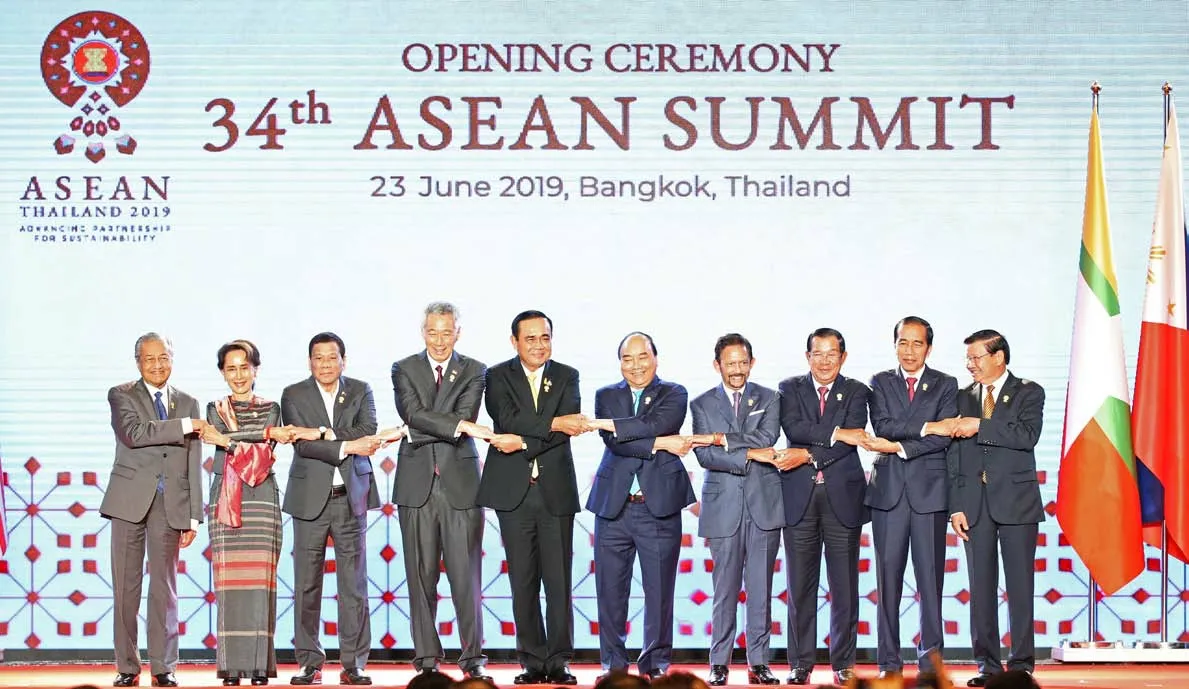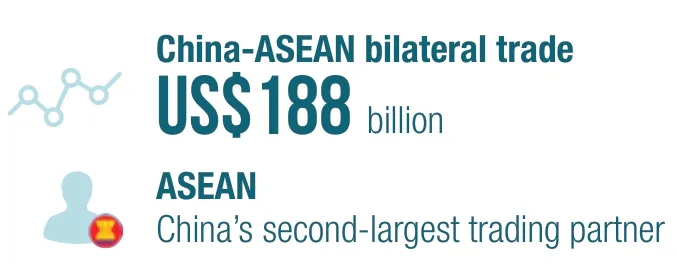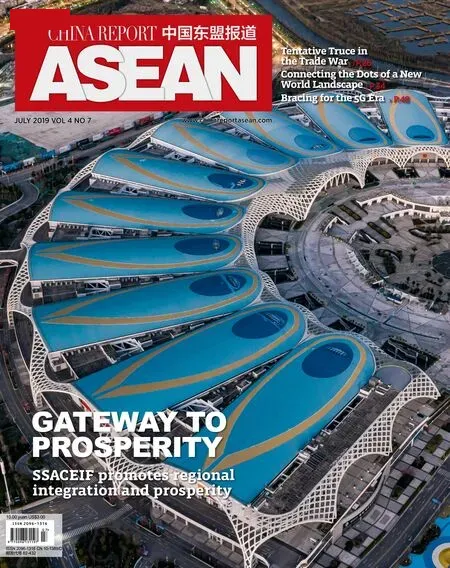SIGNALS FROM THE ASEAN SUMMIT
By Wang Fengjuan
ASEAN's attitude on the China-U.S. trade dispute
O n June 23, the 34th ASEAN Leaders' Meeting with the theme of “Advancing Partnership for Sustainability” concluded in Bangkok,Thailand. In the spirit of cooperation,concerted efforts, progress and sustainable development, the summit mainly focused on political, security,economic and socio-cultural issues.Against the backdrop of great uncertainty brought to the global economy by the trade dispute initiated by the U.S., ASEAN member states sent a clear signal against trade protectionism and firm support for the multilateral trading system. Regional Comprehensive Economic Partnership(RCEP) became a catchphrase at the summit.
Both China and the United States are important partners of ASEAN member states, who are sharing a grave concern about the trade dispute between the two. Zhai Kun, vice president of the Institute of Area Studies at Peking University, believes that the China-U.S.trade dispute has become a key factor or a core variable making a major impact on China-ASEAN cooperation.He believes that the dispute is having a spillover effect on ASEAN in both economics and security.
Can ASEAN Remain Neutral?
At the ASEAN Summit, member states expressed concern about trade protectionism. On June 21, Thailand's Bangkok Post commented that the protracted trade dispute between the two superpowers has caused concern among the leaders of ASEAN member states over whether ASEAN can remain neutral.
On June 19, U.S. Assistant Secretary of Defense for Indo-Pacific Security Affairs Randall Schriver delivered a keynote speech at the U.S.-ASEAN Chamber of Commerce 35th Anniversary Dinner, urging Southeast Asian countries to choose between the U.S. and China. Previously, Singapore Prime Minister Lee Hsien Loong had said at Shangri-La Dialogue that other parties should not force Southeast Asian countries to choose sides between the U.S. and China. The prime minister made this point even earlier at the opening ceremony of the 33rd ASEAN Summit last year. He considers competition between China and the U.S. in the Asia-Pacific region a thorny issue for Southeast Asian countries who have no interest in choosing sides.A trade war will seriously undermine the international multilateral trading system that has benefited every country for many years and will produce positive outcomes for no one.
Thai Prime Minister Prayut Chano-cha also expressed concern. Bisnis Indonesia reported that Prayut predicted that the China-U.S. trade dispute would be a central topic of the Osaka G20 Summit, and that Thailand, Indonesia,Singapore and Vietnam would bring ASEAN perspectives to the discussions.He also expressed hope that discussions would help ease the intensity of the dispute. At the Bloomberg ASEAN Business Summit on June 22, Prayut opined that the trade dispute between major powers has affected the global trade and investment environment and is likely to develop into a fierce trade war.

ASEAN leaders link arms at the 34th ASEAN Summit in Bangkok, Thailand, on June 23.

According to Chinese statistics, from January to April this year, the volume of bilateral trade between China and ASEAN reached US$188 billion. ASEAN has taken the place of the United States as China's second-largest trading partner.
At the latest ASEAN summit, the ASEAN Leaders' Vision Statement on Partnership for Sustainability was adopted. According to the statement,ASEAN remains concerned about the current trend of protectionism and the backlash against globalization,which continue to undermine the world economy and threaten the multilateral trading system. All ASEAN leaders agreed to conclude the RCEP negotiations by the end of the year to revitalize international trade. They also urged all involved parties to increase their efforts to achieve this goal.
RCEP Conducive to Trade Dispute Settlement
The China-U.S. trade dispute has been the focus of the world's attention for more than a year and has exerted a negative impact on order in the Asia-Pacific region, which has been stable for more than 40 years. Zhai Kun believes the dispute has taken a toll on ASEAN countries in economics and trade as well as security.
First, the China-U.S. trade dispute is making a direct impact on economics and trade. According to Chinese statistics, from January to April this year, the volume of bilateral trade between China and ASEAN reached US$188 billion. ASEAN has taken the place of the United States as China's second-largest trading partner. The World Trade Outlook Indicator (WTOI)released by the WTO in February hit a nine-year low. The shrinking of world trade against the backdrop of the China-U.S. trade dispute will inevitably leave an impact on ASEAN. The impact of the trade dispute on Singapore might have emerged, with its growth falling to 1.2 percent in the first quarter of this year, the slowest since 2009. According to 2018 economic data, China-ASEAN trade accounted for 4.1 percent of the total GDP of the two sides, 2.3 percentage points higher than the corresponding figure between China and the United States. The message is that in the current circumstances, China will place more attention on promoting growth in China-ASEAN trade.
Second, economics and trade are not independent from security. From the point of view of the chronological sequence of the latest deterioration of China-U.S. relations, although it would be difficult to determine whether deterioration of bilateral security relations expedited the trade dispute,or vice versa, U.S. containment of China in the Indo-Pacific and the whole world has been unfolding in the East China Sea, South China Sea, Taiwan Straits and more places in a systemic manner. Since the beginning of the Trump administration, the U.S. military has conducted more “freedom of navigation” and “freedom of overflight”operations in the South China Sea than in all of the Obama years. U.S.warships have ventured into Chinese territorial waters quite a few times with increasing risk. Most ASEAN states have been reticent about providing permanent bases for the U.S. military,which has made it difficult for the U.S.to significantly strengthen its military presence in the South China Sea in the short term.
As prime minister of Thailand,which currently holds the chairmanship of ASEAN, Prayut pointed out that the conclusion of RCEP negotiations within this year will be conducive for dispute settlement between ASEAN and its major trading partners. He also expressed ASEAN's hope that China and the U.S. will settle their trade dispute soon.
At the summit, ASEAN leaders expressed firm determination to conclude RCEP negotiations within the year. RCEP is a proposed free trade agreement (FTA) between the 10 ASEAN member states and the six countries with which ASEAN has existing free trade agreements, namely, China,Japan, South Korea, India, Australia and New Zealand. Their total trade volume accounts for 45 percent of global trade. This is the biggest regional trade arrangement in Asia involving the largest number of participating members. The world is increasingly unstable because of trade protectionism and the backlash against globalization. The post-haste conclusion of RCEP negotiations will be tremendously significant to regional trade liberalization and facilitation,global free trade and regional economic integration.

